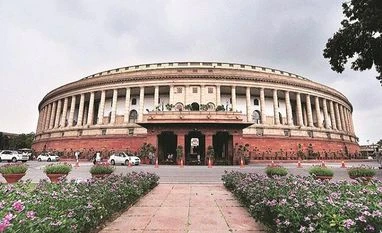Every inch of usable space in the Lok Sabha, Rajya Sabha and the majestic Central Hall is being readied for the forthcoming monsoon session of Parliament that will begin on September 14. The two houses will sit for four-hour spells and are expected to work on Saturdays and Sundays as well. Vice President and Chairman Rajya Sabha, M Venkaiah Naidu and Speaker Lok Sabha, Om Birla, are expected to visit the Parliament House complex tomorrow and Wednesday to carry out dry runs for the session that will be the most technologically challenging one ever conducted in the history of Indian Parliament.
To maintain social distancing, MPs will sit everywhere: The 245-member Rajya Sabha will see 61 MPs seated in the house, and the rest in galleries including the public gallery where normally visitors, who want to see how the houses function, are accommodated. Except the press gallery which will still seat only parliamentary reporters, all other spaces will be occupied by MPs. Some will even sit in the Lok Sabha.
When the Lok Sabha is working, its 545 MPs will be seated in the Rajya Sabha chamber, the Central Hall and the first floor galleries in the Lok Sabha, meant for diplomats, relatives and guests of MPs (the Distinguished Visitors Gallery, or DVG). Four gigantic screens have been erected in the galleries which are interactive. “MPs will be heard and can speak without any difficulty: from the screens, every corner of the two Houses will be visible” said a Rajya Sabha secretariat official.
The Central Hall, where the constitution was unveiled and came into effect in 1950; where India’s first Prime Minister, Jawaharlal Nehru delivered his famous ‘tryst with destiny’ speech; and where today, MPs, former MPs and ministers can amble in, hold privileged conversations with journalists and order cheese sandwiches and masala dosas (these items have figured, with fond nostalgia, in most farewell speeches members have made at the end of their tenure), will be a bustling hive of activity from 14 September. Plexiglass screens are being screwed on, sanitiser dispensers are being put in place and the air conditioning system is being cleaned thoroughly to make sure no Covid-19 contamination is possible. Central Hall will be treated as an extension of the Lok Sabha.
It is not merely seating that has to be considered. If an MP wants to make a speech, say in Santhali, or Tulu, simultaneous translation needs to be made available. This is expected to be linked remotely to translators who will be sitting elsewhere in the building. The same goes for verbatim recoding of speeches, in India’s equivalent of the Hansard. These speeches are crucial because they are part of history.
Both Naidu and Birla are taking great pains to make sure everything goes off without any hitches. Congress’s P Chidambaram (RS, Maharashtra) has implored the government to call off the monsoon session, citing health and infection concerns. If anything, this has only redoubled the determination of the two presiding officers to make sure the session is productive, the government gets everything done and there is no addition to Covid-19 statistics on account of the session.
The government has a heavy agenda: 11 ordinances have to be passed, including ironically, two that will cut MPs and ministers’ salaries by 30 per cent on account of Covid-19. There are several bills to pass and controversies to address, including the one involving news reports about how Facebook has become a factor in Indian elections. 100 per cent productivity is expected in both Houses.
Ordinances that have to be cleared.
- The Salaries and Allowances of Ministers (Amendment) Ordinance 2020, promulgated by the President on April 9. This allowed a salary cut of 30% for the Prime Minister and his entire Council of Ministers for a year in the wake of the coronavirus pandemic.
- The Salaries, Allowances and Pensions of Members of Parliament (Amendment) Ordinance, 2020, promulgated on April 7. The Union Cabinet had approved a 30% cut in the salaries of all MPs and a two-year suspension of the MP Local Area Development (MPLAD) scheme so that the amount saved can go to the Consolidated Fund of India to fight Covid-19.
- The Epidemic Diseases (Amendment) Ordinance 2020 promulgated on April 22. This provides protection to frontline warriors against physical attacks on doctors, nurses and other healthcare workers, and violence has now been made a non-bailable offence punishable by up to seven years in prison.
- The Essential Commodities (Amendment) Ordinance, 2020, promulgated on June 5. This allowed commodities such as edible oils, cereals, onions, pulses, and potatoes to be deregulated.
- The Farmers Produce Trade And Commerce (Promotion And Facilitation) Ordinance, 2020, promulgated on June 5. This promotes a barrier-free inter-state and intra-state commerce and trade outside the physical premises of markets notified under State Agricultural Produce marketing legislation.
- The Farmers (Empowerment And Protection) Agreement On Price Assurance And Farm Services Ordinance, 2020, promulgated on June 5. This allowed farmers to engage with aggregators, processors, large retailers, wholesalers, and exporters on a level playing field without any fear of exploitation.
- The Homeopathy Central Council (Amendment) Ordinance, 2020, promulgated on April 24.
- The Indian Medicine Central Council (Amendment) Ordinance, 2020, promulgated on April 24.
- The Taxation And Other Laws (Relaxation Of Certain Provisions) Ordinance, 2020, promulgated March 31.
- The Insolvency And Bankruptcy Code (Amendment) Ordinance, 2020, promulgated on June 6.
- The Banking Regulation (Amendment) Ordinance promulgated on June 26.
Unlock 30+ premium stories daily hand-picked by our editors, across devices on browser and app.
Pick your favourite companies, get a daily email with all news updates on them.
Full access to our intuitive epaper - clip, save, share articles from any device; newspaper archives from 2006.
Preferential invites to Business Standard events.
Curated newsletters on markets, personal finance, policy & politics, start-ups, technology, and more.



)